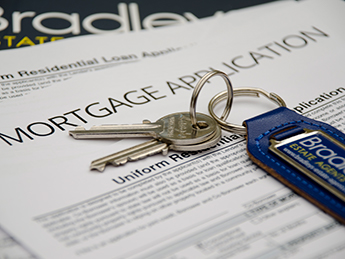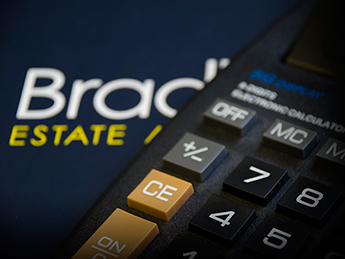“the way of dealing with their customers is so natural and you immediately feel at ease"
Michael and Rebecca WIlliams
Appointment Introduction
Most importantly, you must feel free to ask questions at any time. If something doesn’t make sense, don’t leave it. If something isn’t clear because it’s jargon, then say something and then we can go over it again in a language you are comfortable with.
Each appointment with Bradleys Financial Management Ltd will consist of the following:
- Explanation as to how you are protected as a consumer within the Industry.
- How we fit within the framework of the Industry.
- What we at Bradleys do and why we are a bit different to other advisers you will come across.

Important Background Information
The regulator of the industry – (essentially responsible for every piece of customer facing advice that goes on) are there to protect you, ensure you are treated fairly and that you get the right advice for your circumstances. In hackney terms it means you won’t get ‘stitched up’. In our view our current regulator is the best there has ever been, and the reason is two fold;-
They have teeth, which no previous regulator has had to the same degree. They can suspend people from the Industry temporarily or permanently, they can fine individuals and companies and have been known to put people in jail, so they are very serious about what they do.
2. What they do is transparent. They are very clear and concise about what they expect of us as advisers and what that means to you as a consumer. Every adviser in the Industry is regulated by the FCA so we all have to abide by the same set of rules. Note the FCA does not regulate estate agency, soliciting and conveyancing.
The way they function is very simple. First they ensure every adviser is qualified to give you the advice you seek, which means they test us when we first come into the industry and then they test us on a regular basis throughout our career.

Know the Difference
There are three types of adviser you will come across:First, the bank or building society eg; if go to see Natwest you will get a Natwest Mortgage as they can’t offer you anything else. They will also offer you their insurance products and services as they can’t offer you anything else.
Secondly you can speak to, what is termed in the industry, an Appointed Representative. Most people in the industry call them tied agents. These are essentially organisations that are owned by or tied to an insurance company. Locally we have Your Move which is owned by Aviva and Fullfords who are owned by a massive institution called Countrywide. Insurance companies own estate agents to sell insurance – it’s that simple – that’s what they are there to do. If you use a tied agent adviser you will get their insurance because they are not allowed to offer anything else and they will heavily target the sale of those insurance products. Also, the insurance company has special arrangements with some mortgage lenders, and as a result those advisers can often only use a panel of mortgage lenders, which with some Appointed Representative firms is only 6 or 7 strong. When you consider there are well over 100 lenders in the UK that isn’t really looking at the market for you.
The reason we are different is two-fold:
Firstly, we offer genuinely unbiased advice. We are not owned by, tied to or affiliated with
any bank, building society or insurance company. My job, effectively, is to act as your
employee. We stand in the middle of the market place and shop around the providers on your
behalf so you get the best of what’s available. If you use a bank, building society or tied agent
you won’t get that.
Secondly, customer service is really important to us.
If you take a look around my office you will see all the different cards and thank you letters for
the service we have provided. That is as important to us as it is to running our business. We are
very keen to keep our clients once we have them and we are keen those clients are happy with
the service we have provided as if they are happy they tend to recommend us to other people.
We will do everything for you from A to Z. We will hold your hand right the way through the transaction so you don’t have to worry about what to do, as we will either do it for you and or let you know if we need you to do something.

THE MEATY BIT
Firstly, we explain all this ‘stuff’ to you so you understand how it all works. Secondly, we will find out enough about your circumstances to enable us to give you the advice that you seek. Black and white information, if you like. Clearly what is also important is understanding what makes you tick, so we understand what is important to you, what is not important to you, what you want your mortgage to look like and how it needs to function for you, things you like, things you don’t like and your hopes and fears so that we understand your mortgage requirements.
What we will also do is explain the pros and cons of the products available so you understand what your options are, how much you can borrow, how much you can afford to pay back each month and how much it is going to cost you to set your mortgage up in the first place. You will need to know all of this before you go off and buy a property.
Assuming you have got to this point and you understand where you are at and what you can and cannot do, the next thing is to get confirmation you can get a mortgage, and that’s what we do by way of something called a ‘Decision In Principle’ (DIP) or an ‘Agreement In Principle’ (AIP). We provide a mortgage lender with your basic outline information, just as you have given us really. The lender will then do a credit check on you to make sure you pay your loans, mortgage and credit card payments on time. They will also what is essentially a profiling exercise and the lender is looking at your entire circumstances – address and employment history, electoral register history, that kind of thing.
What they are trying to do is build a profile so they can assess that if they were to lend you some money how likely you probably are to pay it back– just like you would do if you were going to lend someone some money – it’s no different really, they just use very technical procedures.
Assuming this is all ok the lender gives you a Decision In Principle, so that subject to the property you buy being acceptable to the lender (ie: it’s not falling down) and all the information you provided, such as income and credit commitments, proves to be accurate, what the lender is saying is ‘We will lend you the money if you want to borrow from us’.
An AIP/DIP costs nothing to get, you do not have to provide any bank or card details and it does not commit you to anything – not even signing a document.
What the lender is doing is offering you the facility of a mortgage in the hope that when you buy a house you go back to them. A lending decision typically lasts for 90 days from the day you do it. If you haven’t used it by the end of the 90-day period, it basically dies. The lender will not contact you again, there is no marketing involved and you don’t become a customer.
If in that 90-day period we have completed an AIP for you with, for example, Natwest, and when you come back to see me within that 90-day period the Halifax is offering a better deal, we can use the Halifax providing they will lend to you. We do not have to go back to Natwest, but if all else fails you know Natwest will lend you the money, so you are safe in the knowledge you can buy a house if that’s what you want to do. We can worry about the finer details once you have found your house.
So, that’s the AIP and we have assumed you have got to that point.
You have gone off and found a house. You come back to us, what do you do now?
We need to make sure you get the right mortgage with the right lender, but more importantly that you understand why. I don’t just say ‘do this’ and you blindly say ‘ok’
I want to you to understand why I have recommended a particular deal and that you are confident and happy that the deal is the best for you and, just as importantly you understand why.
We will then submit the application for you.
The application will land in the lender’s offices instantly. They will then contact us to let us know what documentation they will need and we will forward this to them so that they can assess you application and make sure everything that you have said fits and is acceptable to them. They will get a mortgage valuation carried out on the property (we will come to this a bit later), and as long as that’s ok they will issue to you what is called a ‘Formal Mortgage Offer’ - essentially everything has gone through the sausage machine and the lender says ‘yes, we will definitely lend you the money’.
Once this happens a copy comes to you, a copy comes to me so I can check the lender hasn’t made any mistakes, and a copy will also go to your solicitor.
I will then almost take a step back and my colleagues, Claire, Yvonne and Caroline, will then liaise with your solicitors and estate agent, and of course you, to make sure if any queries come up or you have a problem you need dealing with, they will ensure its dealt without you having to do too much.
Essentially what we do is hold your hand throughout the transaction from the minute we meet until the day you pick up your keys.
The service doesn’t end there either, if you have any questions we are always going to be here for you and also when your mortgage deal runs out we will write to you to let you know that you will need to relook at your mortgage and we can arrange a time to meet with you to look at what your options are.
It’s an ongoing service and we want to keep you as a customer forever. That’s how we work.
That is an overview of the process and what is involved, now you will want to know the most important bits…
The most important bits broken down:
You want to know how much you can borrow, what the different interest rates are, how long can you do your mortgage over (the term), how much it’s going to cost you to set it up, and how much it’s going to cost you per calendar month.
Let’s take them in order:

How Much Can You Borrow
Based on the information you’ve given about your income, circumstances and your commitments, in the past, lenders would add your two salaries together and multiply this by four and that’s what they would let you borrow. That’s not very scientific and the main reason it’s not appropriate is because someone who’s 21, buying with their partner who’s also 21, and earning £40,000 a year clearly has much longer to pay their mortgage off than a couple who are 55 on the same income who clearly have a shorter time to retirement.
What the lenders have done is devise a new system based on affordability. Essentially they work backwards. They ask how much you have coming in each month, the outgoings (like loans and how much they cost per month, child maintenance, student loans, credit card balances or car finance) which must be deducted from the income as the lender knows they have to be paid. They then assess how much they think is it going to cost you to live in your house where you are buying?
The system they use for this is based on the Office of National Statistics and they use a standardised framework for the cost of living, depending on how many people will be in the property and where the property is in the UK. Whatever is left over is what the lender thinks you can afford to pay out on a mortgage and they use this to assess your borrowing capability.
All the lenders have to work within the same framework laid down by the regulator but they can interpret that framework as they see fit. As a result different lenders can offer different amounts – that’s why you will see different offers from different mortgage companies, as they all see things differently.
Based on the information you have provided we will do a couple of affordability checks with lenders on line , which literally takes thirty seconds and it will come back with a ‘you can borrow ‘x’ pounds. So, we know much you can borrow, although this not an AIP.

WHAT DIFFERENT INTEREST RATES ARE THERE?
What we are not going to do is go into detail now as to the rates you can get – we will look at this in a minute. What we want you to understand is the different types of interest rates available and the pros and cons.
Essentially there are two: Fixed and Not Fixed / variable.
A Fixed rate works where you have an interest rate that is pre-determined at the beginning of your loan and it says the same for an agreed period of time. Typically, in today’s market, this is two, three, five, seven or ten years. The longer the fixed rate the higher the rate will be, so it’s more expensive to fix for a longer term. However what you get with long term fixed rates is greater security as you know that you have fixed your rate for, say, five years so you know what you are going to pay for five years.
Variable rate products do ‘what they say on the tin’. There a number of different types of variable products, but in essence they all mean the same. The rate can go up or down. The disadvantage is that you have no control over your monthly payments because if the Bank of England puts the base rate up, or the lender decides to increase their interest rates, your mortgage payment will rise and there is nothing you can do about it. The advantage of variable rate products is they can be cheaper that fixed rate products. At the moment they are only marginally cheaper, (if at all). Generally speaking, a good time to fix is when interest rates are low and a good time for variable rates is when interest rates are high. When interest rates are high they are probably going to drop and when they are low they are probably going to rise.

THE TERM OF THE MORTGAGE
The term of the mortgage, or how long you do your mortgage over, will depend on what your budget lets you do because the shorter the period of time you do your mortgage the higher the monthly payments. Conversely the longer the term the cheaper the monthly payments will be.It’s a bit like a piece of plasticine - the more you squeeze it, it goes up, it you stretch it, it comes down.
Mortgage lenders typically have a maximum term of 35-years, although there are one or two who will do slightly longer, and mortgage lenders generically want you to pay your mortgage off by the time you reach normal retirement age. The minimum term is usually five years. You can do almost anything as long as you can afford it and the lender thinks you can afford it.

Setup Costs
In terms of cost you need to consider the following:
1. Your deposit. How much money you have available to put into the transaction in the first place.
2. You will need to employ a solicitor. The solicitor does what is called a ‘conveyance’ - a posh word for when a property changes hands. You can do a conveyance yourself – it can be done – but it’s too complicated for most people. We are lucky in our catchment area as we have some very good solicitors who will do a good job for you for a reasonable price. Our advice to you is to use a professional as they will do the job properly. We can put you in contact with some local firms should you wish. Fees will vary depending on purchase price, whether you are buying and selling, where you are buying and the type of property you are buying can also have an influence.
You will possibly also be liable for “Stamp Duty” – this is tax on buying a property. The level of duty you must pay depends on the price of the property you are buying and also how many properties you own – most people who are buying a second home or an investment property will now pay a higher rate of duty. This is collected by your solicitor on behalf of HMRC.
3. Survey. The word survey, when it comes to buying a property, is often misused. People think when the mortgage lender goes in and inspects the property in relation to the mortgage they think it is being done for them. A lender’s inspection is done by the lender for the lender – they are not really interested in you. What they are interested in is that if you don’t pay your mortgage and they want to get their money back, they can do so by selling the house, so they want to make sure it is worth what you are paying for it. This inspection is called a motgage valuation and essentially it is worthless to you as the buyer.
What they are looking at is a) is the house worth what it needs to be worth? b) Is the house structurally sound? To find this out they do what is called a mortgage valuation, which is a very basic inspection of the property which will point out major structural defects, but only those the surveyor thinks the lender needs to know about. For you it’s a worthless piece of paper. For a new build or very modern property a basic valuation might be enough as a new property comes with a ten-year warranty, and very modern property shouldn’t have too much wrong with it, but it doesn’t give you any legal comeback. If you want more peace of mind you should have a proper survey done. There are two types – a Homebuyers Report or a Building Survey.
A Building Survey is a survey that will go through the property like a dose of salts. It will turn the property upside down, shake it and see what falls out. Even if the property is ok it sometimes comes across that the property is falling to pieces and often, a full building survey will put you off buying a property even though it’s perfectly fine. It could be said that a full building survey is really designed for properties of unusual design or construction (such as cob with a thatched roof), something architecturally designed so it’s a one-off, a property built in an unusual location such as on the side of a hill or on the coast, on unusual soil surfaces, or even if it’s just not a very good condition and you are a bit concerned about it.
The Homebuyer’s Report, which is the middle ground survey, is for everything else. Anything that’s Victorian or newer and built of traditional materials is suitable for a Homebuyer’s Report by most surveyors. If you were buying a 1975 built 3-bedroom semi-detached house a Homebuyer’s report would probably be more than enough, unless it’s in a really poor state of repair. If you came to us and said ‘this is what we are buying, what kind of survey should we have?’ We could give you some guidance, although ultimately it is clearly your decision. We are able to put you in contact with local Chartered Surveyors should you wish & we can provide guidance on the cost of the different types of survey as these vary from lender to lender and also depending on the price, size and style of property.
The FCA does not regulate surveys.

Arrangement Fees
Lenders will often charge an arrangement fee on a mortgage. They are banks all said and done. Arrangement fees are an example of that. However don’t get carried away with the thought that is the lender profiteering. Sometimes paying an arrangement fee gives you a cheaper interest rate and if getting that means your monthly payments are lower, so much so that you get your arrangement fee back over the duration of your mortgage, then it could be worth paying the arrangement fee..
We also charge a fee for the service we provide which we believe represents good value for money based on the service provided.

Deposit
You only have the money you’ve got – unless you go and rob a bank! The size of your deposit will influence the deal that you get. When lenders are offering interest rates to people the bigger the deposit you provide the cheaper the rate you get. It’s as simple and straight forward as that. The bands are in bands of 5%. So a 5% deposit means you are borrowing at 95%, or a 10% deposit which means you are borrowing 90%. If you have a 10% deposit you will get a cheaper deposit that if you have a 5% deposit. If you have 15% it’s cheaper still and so on and so forth.
Those are likely to be the costs involved in your purchase.

Budget Analysis
We will also help you analyse your budget. The amount you can borrow is very often way more than people can afford, so we would say ok, let’s look at what you can actually afford.
For example – you may be able to borrow £180,000 and you will say how much will that cost me?
If we say “it will cost you so much”, this is often way more than you think you will be able to afford, and probably more than you want to pay.
We will then do a basic budget analysis – Gas, electric, council tax, water, car, phone, food etc. When we breakdown the outgoings and allow for any possible additional expenses we then can see what is affordable to repay on a monthly basis and it becomes much clearer.



















